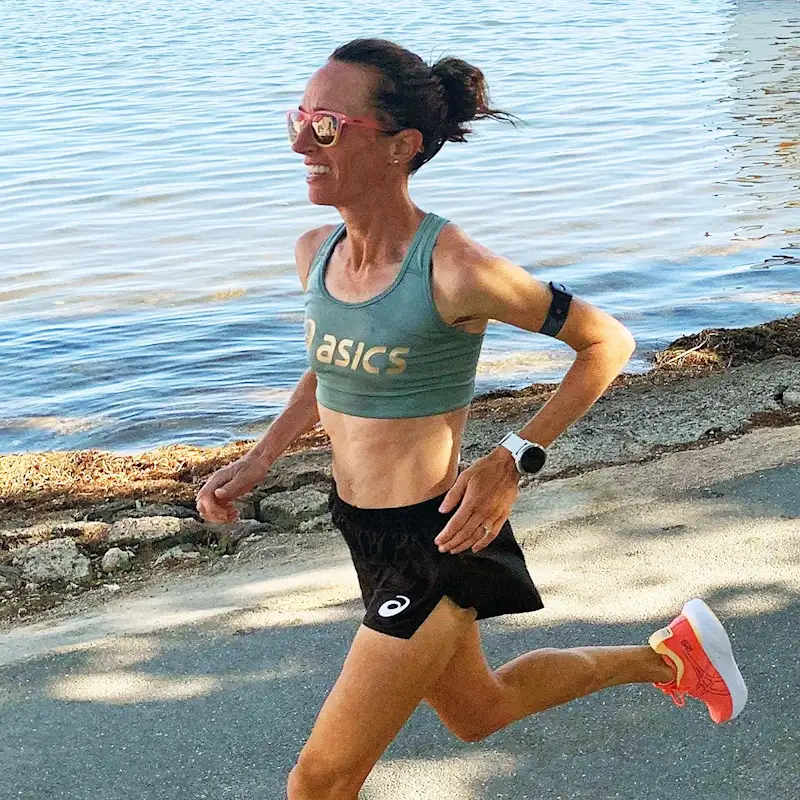
Lisa Weightman
Berlin Marathon
Lisa's headline numbers
Lisa's strategy
Fueling
Carbohydrate is the main fuel you burn when racing. Failing to fuel properly is a leading cause of underperformance in longer races.
Lisa stepped up her carb intake for the Berlin Marathon compared to her last race at the Sunshine Coast Half Marathon by adding a few more PF 30 Gels during the run. Incorporating more carbs for longer races like a marathon is a sensible way to ensure she can sustain her pace for the full distance. Adding one or two more PF 30 Gels could have brought her closer to the recommended 75g per hour, potentially preventing the energy dip she experienced later in the race. Lisa also acknowledged that she could have been carrying some fatigue from the demands of being an Olympic reserve for Paris 2024 and the need to stay in peak form for both events. This double focus likely impacted her ability to fully prepare for and peak at Berlin specifically.
Hydration
Taking on board an appropriate amount of fluid and sodium is essential to maintaining blood volume and supporting the cardiovascular effort needed to perform on race day.
Whilst the absolute amount of sodium and fluid consumed per hour is important, it’s critical to consider these in relation to each other. This is known as 'relative sodium concentration' and it’s expressed in milligrams per litre (mg/L). How much sodium you’re taking in per litre of fluid is more important than the absolute amount taken in per hour.
Sweat sodium concentration (mg/L) is largely genetically determined and remains relatively stable. Knowing how salty your sweat is enables you to replace a good proportion of your sweat losses, which can range from 200-2,000mg/L.
Whilst Lisa’s losses are on the low side, getting her hydration strategy right is still important if she wants to perform at her best.
Learn moreLisa’s fluid intake was well-suited to the cool race conditions. She picked up PF Carb & Electrolyte Drink Mix around the 5km mark and opted for plain water at subsequent aid stations. Although her sodium intake was lower than recommended, she avoided cramps or significant signs of dehydration. Aside from some ankle discomfort and a sense that her legs couldn’t run faster, she reported no major issues. In future races, Lisa could consider taking some Electrolyte Capsules to increase the amount of sodium she consumes to support her hydration status.
Caffeine
Beyond the Three Levers of Performance (carb, sodium and fluid), caffeine is one of only a few substances that is proven to improve performance for most endurance athletes as it can help stave off mental and physical fatigue.
At the 25km mark, Lisa took a PF 30 Caffeine Gel, which likely provided an energy boost for the final 10km. She may have seen greater benefits from taking an additional PF 30 Caffeine Gel before the race or within the first 5-15km, instead of her usual PF 30 Gel. This approach would have delivered more consistent ergogenic effects, aligning her intake with the recommended 3-6mg/kg of caffeine, and potentially enhancing her performance.
How Lisa hit her numbers
Here's everything that Lisa ate and drank on the day...
Lisa's weapons of choice
Final thoughts
Lisa's full stats
Data Confidence?
There is an adequate level of accuracy in the data collected and the numbers reported. The athlete manages to recall what they ate and drank including most specifics (brands flavours quantities plausible estimations of volumes). However there are estimations made within the data which affect the overall confidence level in the data reported.